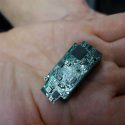Research establishment spawns research-supply spinoffs
For a century, Wisconsin’s traditional metal-working industries spawned a broad and profitable series of tool-and-diemaking firms that marketed nationwide.
Now, the immense variety of biological research at UW–Madison has spawned a range of companies that produce the complex supplies, materials and expertise needed by food, health and pharmaceuticals companies, and by basic researchers.
Only now, the market is not nationwide. It is worldwide.
These spinoffs range in size and focus.
TRAC Microbiology, a specialist in food regulation and safety, was formed by Virginia Deibel in 2001, who says she “was getting a Ph.D. in food science and microbiology and decided to open my own business.”
TRAC is typically summoned after a plant has been shut down by regulators, and businesspeople are frantic, Deibel says. “They are worried about jobs; they are not in operation and they have not been able to identify the microbiological problem. Producers need to identify the pathogenic or spoilage microorganism in their product and how it got there before they can begin correcting the problem.”
With multiple capacities for identifying pathogens and refining production processes, TRAC satisfies “a need to focus on the ways pathogens enter into food plants,” Deibel says. “My form of investigative microbiology is still rather rare in the industry.” With headquarters in Madison, TRAC has about 20 employees.
Making toxin rather than detecting it is the focus at Metabiologics Inc., a spinoff by bacteriology professor Eric Johnson. When he arrived in 1985 to UW–Madison’s Food Research Institute, he already had knowledge of Clostridium botulinum, the bacterium that makes the nerve toxin now marketed as the wrinkle-eraser Botox, Johnson says. “I was fortunate to enter an environment with three top experts, including Ed Schantz, who helped me make my first batches of botulinum toxin. We provided them to a doctor in San Francisco who wanted to test it for de-activating nerves, but Ed never got credit for it.”
Because tiny doses can temporarily deactivate nerves, botulinum toxin became useful in neurology, and Johnson began supplying toxin from his university lab, which led to the formation of Metabiologics in 1998.
Botulinum toxin is also a key product at Mentor Biologics, a Madison firm now owned by Johnson & Johnson. “Directly or indirectly, my lab has been responsible for two businesses in Madison,” Johnson says.
Just as manufacturers require precise machine tools, researchers require reagents — tiny quantities of highly specific molecules — for a wide range of research procedures. Promega, one of the largest privately held suppliers worldwide, was founded in 1978 by Bill Linton, who had been a graduate student in pharmaceutical chemistry in the mid-1970s. The company started by producing enzymes for researchers, but in response to the market, now offers more than 2,000 products for basic research, drug discovery, forensics, paternity testing and medical diagnosis. Promega has headquarters in Fitchburg, Wis., and offices in 15 countries. About 650 employees work in Dane County and 550 elsewhere in the world.
Tiny quantities of molecules called antibodies are used to study how proteins interact in biological systems, and to help detect and treat diseases such as breast cancer and multiple sclerosis. NeoClone, based on technology spun out of UW–Madison’s oncology department, has been developing and commercializing antibodies for about 10 years and has grown to 15 full-time employees, with more than 600 customers in 30-plus countries.
According to CEO Deven McGlenn, “We have a catalog of antibodies and a custom antibody-development service for clients, many of whom are focused on the potential that antibodies have as diagnostics and drugs for cancer, flu and other diseases.” NeoClone also continues to license antibodies invented at UW–Madison, particularly in the lab of Richard Burgess, an oncology professor who founded the university’s Biotechnology Center in 1984.
NimbleGen, a maker of high-speed DNA analysis equipment, is one of the spinoffs that emerged from collaborations among the diverse of scientific and engineering departments at UW–Madison. The company was a response to the revolution in reading the DNA code, says company co-founder Michael Sussman, a professor of biochemistry.
“I was appointed director of the Biotechnology Center in 1998, when the first human genome was getting sequenced.” With the “spelling” of human DNA finally being read, scientists needed to know when the instructions carried in each of roughly 30,000 genes became active. One approach, called the “gene chip,” had started to reach the market, but they were slow and laborious to produce.
Sussman wondered if chips could be produced using techniques like those that made computer chips, and John Wiley, then the UW–Madison provost, suggested he contact engineering professor Franco Cerrina, an expert in a new technique for making chips.
“Franco did not know anything about DNA, and I did not know anything about making chips, but we started teaching each other,” says Sussman. Soon, with help from third co-founder Fred Blattner, a professor of bacteriology and a veteran Madison entrepreneur, NimbleGen was formed to produce DNA chips.
The chips can simultaneously detect activity in 30,000 genes on a glass surface just two centimeters square, says Sussman. “We could measure the entire genetic expression of a newly sequenced organism in an afternoon. With other chips, you have to wait a month, and the chips would cost $100,000.”
Gene chips are revolutionizing medicine and biology, says Sussman. “When you run a tumor sample through a chip, it may show that 300 genes have changed their expression — have become more or less active — so they must have something to do with cancer.” Gene chips have helped explain why 10 percent of breast cancers failed to respond to drugs, Sussman adds. “This meant they were somehow different. You could not see that under a microscope, but gene chips showed that genetically, there were two subsets of tumors.”
The ability to do such analyses quickly and relatively cheaply helped convince pharmaceutical giant Roche to buy the business for $272.5 million in 2007. RocheNimbleGen continues to operate a development lab in University Research Park in Madison.
“It’s hard to imagine a better place than UW–Madison for scientists to become an entrepreneur,” says Sussman. “I had a professor’s salary, I was doing OK, and we had this idea, and we sought out the people who could help. At Wisconsin, you have anything you need. I’ve had offers for much more money, but those campuses were not as strong in engineering or chemistry. I know a lot of biology, but I need others around me who know these other areas. Having a place like this, with everything in walking distance, is rare — and priceless.”
Subscribe to Wisconsin Ideas
Want more stories of the Wisconsin Idea in action? Sign-up for our monthly e-newsletter highlighting how Badgers are taking their education and research beyond the boundaries of the classroom to improve lives.



